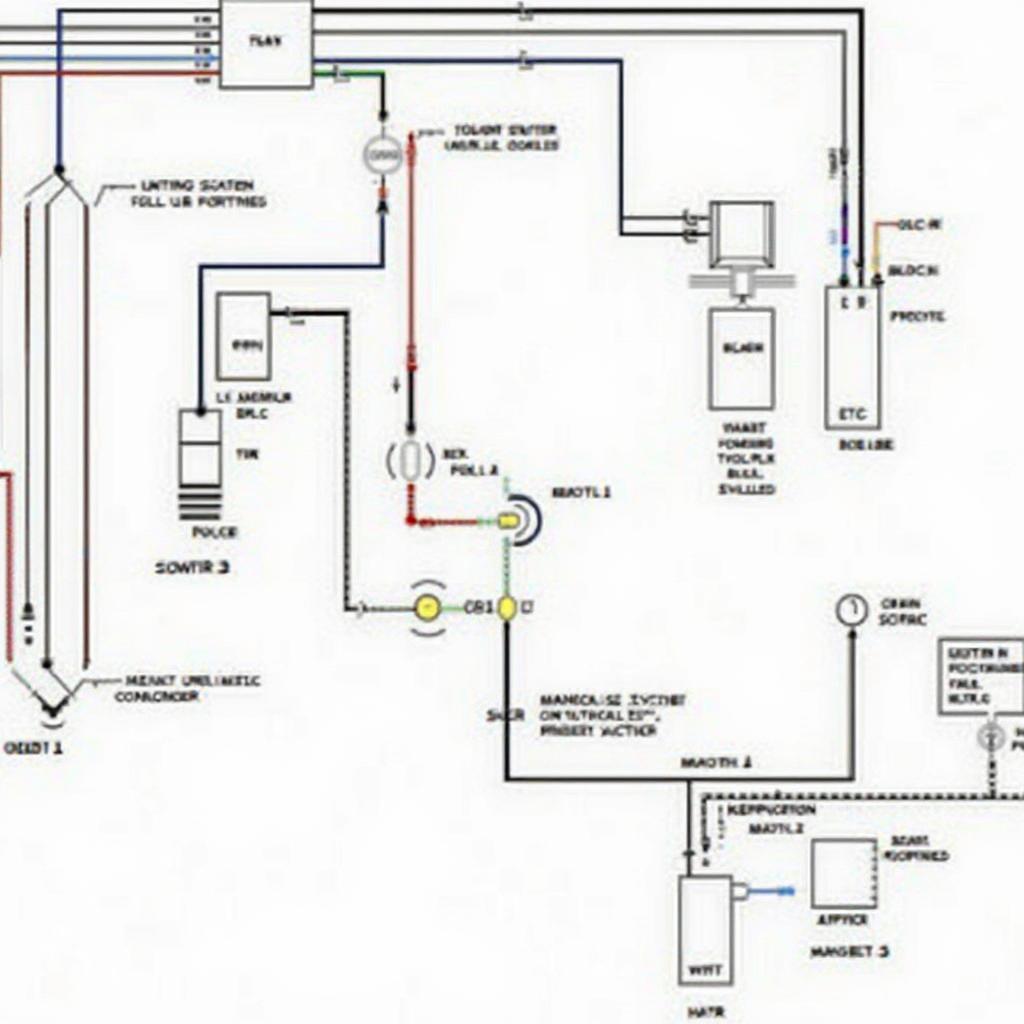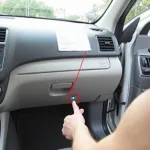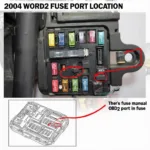Understanding the nuances of an OBD2 to OBD1 engine harness is crucial for anyone working with older and newer vehicle models. This conversion can be a complex undertaking, demanding a thorough understanding of both systems and their compatibility. This guide provides a deep dive into the intricacies of OBD2 to OBD1 engine harnesses, equipping you with the knowledge to navigate this conversion process.
Why Convert to an OBD1 Engine Harness?
There are several reasons why someone might choose to convert from an OBD2 to an OBD1 engine harness. One common reason is engine swapping. Enthusiasts often swap newer, more powerful OBD2 engines into older OBD1 vehicles. Using an OBD1 engine harness simplifies the integration process, allowing them to bypass the more complex OBD2 electronics. Another reason is the perceived simplicity of OBD1 systems. Some find OBD1 diagnostics and tuning easier than OBD2, making it preferable for certain applications. Finally, cost can be a factor. In some cases, sourcing an OBD1 engine harness and related components can be less expensive than retrofitting an OBD2 system.
What are the primary benefits of this conversion? Sometimes, it’s simply easier to use an older, simpler system. For example, tuning an OBD1 engine can be less complicated for certain modifications.
After this section, we will explore the challenges of using an OBD1 harness on an OBD2 engine. For more information on using an OBD1 harness on an OBD2 engine, visit obd1 harness on obd2 engine.
Challenges of OBD2 to OBD1 Engine Harness Conversions
While there are advantages to using an OBD1 engine harness, the conversion isn’t without its challenges. One of the biggest hurdles is emissions compliance. OBD2 systems have stricter emissions regulations than OBD1. Converting to an OBD1 harness might make it difficult to pass emissions tests in certain regions. Another challenge is the potential loss of functionality. OBD2 systems offer more advanced diagnostics and control over engine parameters. Converting to OBD1 might mean sacrificing some of these features. Lastly, compatibility issues can arise. Not all OBD2 engines are easily compatible with OBD1 harnesses, requiring significant modifications and custom wiring.
Understanding Compatibility Issues
Understanding the compatibility between your engine and the desired OBD1 harness is paramount. Different manufacturers and even different engine generations within the same manufacturer can have vastly different wiring configurations. This can lead to significant headaches if not properly addressed. Researching specific forums and communities dedicated to your engine and vehicle can be invaluable in identifying potential compatibility issues and finding solutions.
What makes this process so complicated? Primarily, it’s the different wiring configurations and sensor requirements between OBD1 and OBD2 systems.
Step-by-Step Guide for OBD2 to OBD1 Conversion
- Research and Planning: Thoroughly research the specific requirements for your engine and vehicle. Identify the correct OBD1 engine harness and any necessary adapters or modifications.
- Gather Necessary Components: Acquire the OBD1 engine harness, ECU, distributor, and any other required components.
- Wiring and Connections: Carefully connect the OBD1 harness to the engine, ECU, and other components. Double-check all connections to ensure accuracy.
- Testing and Troubleshooting: Test the engine and monitor for any error codes or malfunctions. Troubleshoot any issues that arise.
Converting a 1994 Honda Civic to OBD2 might be relevant to your situation. You can learn more about it at 1994 honda civic obd2 conversion.
 OBD2 to OBD1 Conversion Wiring Diagram
OBD2 to OBD1 Conversion Wiring Diagram
“Thorough planning and meticulous execution are key to a successful OBD2 to OBD1 conversion,” advises John Smith, a seasoned automotive engineer with over 20 years of experience. “Overlooking even a small detail can lead to significant problems down the line.”
Finding the Right OBD2 to OBD1 Engine Harness
Sourcing the correct engine harness is crucial. Using the wrong harness can lead to compatibility issues, electrical problems, and ultimately, a failed conversion. Check with reputable suppliers who specialize in engine swaps and performance parts. They can often provide guidance and recommend the appropriate harness for your specific application.
Utilizing Online Resources
Online forums and communities dedicated to engine swaps and performance modifications can be invaluable resources. Experienced members can offer advice, share their experiences, and provide troubleshooting tips. You can find specific information about using an OBD1 engine harness in an OBD2 car at obd1 engine harness obd2 car.
“Don’t underestimate the power of online communities,” says Maria Garcia, a renowned automotive technician and author. “The collective knowledge and experience of these groups can be a lifesaver when tackling complex projects like engine swaps and harness conversions.” If you’re working with a Civic, check out this guide on how to convert obd1 to obd2 civic.
Conclusion
Converting from an OBD2 to an OBD1 engine harness can be a complex process, but with careful planning, research, and execution, it’s achievable. Understanding the challenges, compatibility issues, and necessary steps will help ensure a successful conversion. Remember to consult with experienced professionals and utilize online resources for guidance. For those working with H22 engines, information on the obd2 h22 engine harness might be helpful.
FAQ
- Why convert to OBD1? Simplicity and cost can be driving factors.
- What are the challenges? Emissions compliance and potential loss of functionality.
- Where can I find a compatible harness? Reputable suppliers and online communities.
- What tools do I need? Basic hand tools and a wiring diagram.
- Is this legal? Check local regulations regarding emissions compliance.
- What if I encounter problems? Consult online forums or a professional mechanic.
- How long does the conversion take? It varies depending on the specific application.
Looking for more information? Check out our other articles on OBD systems and engine conversions. Need personalized support? Contact us via WhatsApp: +1(641)206-8880, or Email: [email protected]. Our 24/7 customer service team is ready to assist you.

